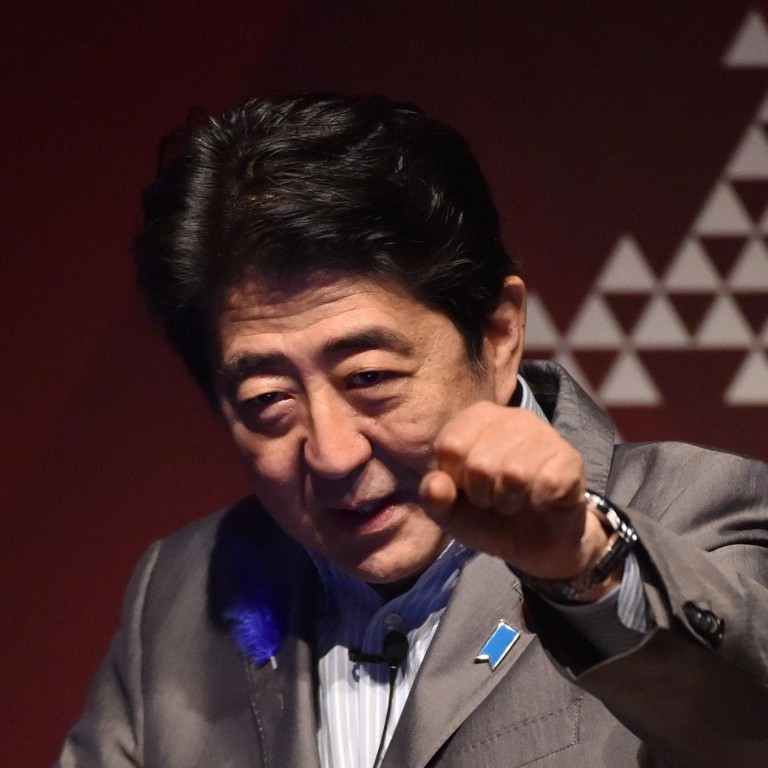
Enough of Abe's politics; Japan needs to lift its economic game
Hiroshima in August is almost hot enough to fry an egg on the pavement, and the air is stifling. Seventy years ago on August 6 at 8.15am, Hiroshima's air became unbreathable as the US Boeing B-29 Superfortress aircraft Enola Gay dropped the first atomic bomb on a city, raising temperatures to 3,000 degrees Celsius.
Those close to the hypocentre were vaporised, and tens of thousands more lived in pain and suffering for months, years, decades. "I am become Death, the destroyer of worlds," said J. Robert Oppenheimer, father of the atomic bomb, quoting from the Bhagavad Gita.
Japanese Prime Minister Shinzo Abe has another few days to reflect on war and peace before his address commemorating the 70th anniversary of Japan's defeat and surrender nine days after the first atomic atrocity. He has a wonderful opportunity to set a new path for Japan, for Asia and the world. I fear that he will continue to bulldoze a wrong and dangerous road.
It seems to matter little to Abe that most of the Japanese people are against what he is doing
Soon after Abe returned to power, one of the prime minister's close advisers told me Abe had two inner demons wrestling for his heart and soul: the good fairy wants him to concentrate on restoring peace-loving Japan's economic vitality; the other is the spirit of his grandfather Nobusuke Kishi, a key member of Japan's wartime government, beckoning him to rewrite history and restore the country's political standing, as he sees it.
Sadly, the good fairy is losing. Late last year, Abe called early general elections, claiming that he needed the mandate to consolidate his so-called Abenomics to lift the faltering economy. Since then, Abenomics has hardly figured on Abe's agenda as he has devoted his energy to his grandfather's quest of making Japan a "normal country".
Political discussions and media reports circle endlessly round which words Abe will use for the 70th anniversary and whether he will formally apologise.
Abe's core supporters in the ruling Liberal Democratic Party are demanding that he stand up against foreign pressure and "restore Japan's honour and trust". In particular, they bitterly complain about the apology that then chief cabinet secretary Yohei Kono offered in 1993 to the sex slaves.
Abe has a deserved reputation as a Japanese nationalist. Having investigated and found too many obstacles to change the constitution by passing amendments or rewriting it, Abe decided it would be easier to sidestep and reinterpret it, then use his parliamentary majority for the simpler task of passing new security laws implementing his reinterpretation. Such laws are going through parliament.
It seems to matter little to him that most of the Japanese people are against what he is doing.
Abe should leave history to the historians and calculate the costs and benefits of being a "normal" 21st century country. His good fairy, if Abe allowed her to whisper wisdom in his ear, would tell him that strutting on a global stage depends on having the economic strength to maintain it.
She would add that "Abenomics" is increasingly a joke because Abe has failed to achieve radical reforms that would reinvigorate an economy suffering from arteriosclerosis of an ageing, declining population. They have done little for ordinary families.
Abe should say apologies alone cannot recompense for the suffering and destruction Japan caused (or for the suffering imposed on Japan). To show his good intent, he should go to Nanjing to pray for those who perished there.
He also should invite presidents Xi Jinping and Barack Obama to Japan, where they will pray together at Hiroshima and at Nagasaki, and then go to a Kyoto temple for a long weekend summit to smooth away suspicions and reach practical conclusions on how to preserve peace and prevent greedy humans destroying the planet by militarism, trade wars or climate change.
But I am sure that there are too many wicked fairies in Tokyo, Beijing and Washington waving their evil wands, even if Abe's good fairy can convince him that the best peace is shared prosperity.

